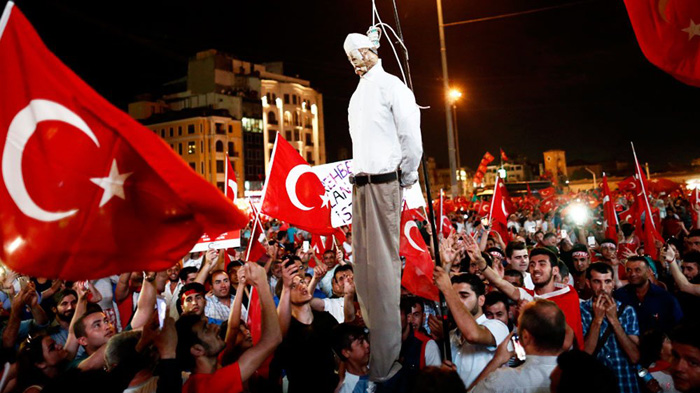SHLOMO AVINERI
The aftermath of Turkey’s failed military coup raises a fundamental question: will President Recep Tayyip Erdoğan continue to pursue his authoritarian path, perhaps with a vengeance, or will he reach out to his opponents and attempt to bridge the deep fissures in Turkish society?
The jury is still out, but judging from previous historical examples, serious challenges to authoritarian or semi-authoritarian leaders usually lead to a hardening of the regime, not greater moderation. And Erdoğan’s moves since the coup’s collapse – mass arrests and purges of thousands of soldiers, judges, police, and teachers were announced almost immediately – seem to confirm the more pessimistic scenario.
Yet it would be a mistake to view what is now happening in Turkey exclusively through the prism of Erdoğan’s personality and his authoritarian inclinations. He and his Justice and Development Party (AKP) represent a tectonic shift in Turkish politics, one with parallels in other Muslim-majority countries in the Middle East.
In trying to move the path of Turkish history away from the radical secularism of modern Turkey’s founder, Kemal Atatürk, the AKP initially appeared to veer from the Kemalist authoritarian mold. Because Western observers were supportive of the secular nature of Kemalism, many overlooked that the regime was more similar to 1930s European fascism – a nationalistic one-party state with Atatürk himself at the apex of a personality cult – than to liberal democracy. Only in the 1950s was the system slowly loosened.
Kemalist secularism was not the expression of a wide, popular movement from below; it was imposed by a small urban elite – military and intellectual – on a traditional and mostly rural society. Kemalism not only introduced a variant of the Latin alphabet, which totally cut off Turks from any link to their history and culture; it also banned traditional forms of attire (fez, baggy trousers for men, headscarves for women) and forced a European dress code on the entire population. All Arabic- or Muslim-sounding surnames had to be changed to Turkic ones.
No European society has experienced so wrenching a process of top-down cultural revolution. In the West, secularization went hand in hand with the Enlightenment project of democratization and liberalization. In Turkey – and in a less radical form under the Shah in Iran and under military dictators in countries like Egypt, Tunisia, Syria, and Iraq – the population never had a choice.
The AKP’s electoral victories since 2002 (as well as comparable developments in other Muslim countries) were, in a way, the return of the repressed. Because the Kemalist system eventually liberalized politically (though not culturally), the emergence of a multiparty system eventually also empowered the traditional conservatives whose preferences had long been denied.
At the same time, economic modernization brought social mobility to the conservatives, which led to the emergence of a new bourgeoisie that clung to its traditional religious values and viewed the Kemalist elite – ensconced in the army, the bureaucracy, the judiciary, and the universities – as oppressors. These voters formed the basis of the AKP’s electoral victories and democratic legitimacy. The recent effort by elements of the army – the shield of Kemalist secularism – to overturn the will of the people (as it has done three times in the last half-century) confirms the continuing clash between secularism and democracy in Turkey.
At the same time, Erdoğan’s foreign policy in recent years has been anything but successful. His initial commitment to “zero conflicts with neighbors” has led, instead, to deteriorating relations with Armenia, Russia, Israel, and Egypt – not to mention significant domestic blowback, including a wave of terrorist attacks, from involvement in Syria’s civil war.
None of this has eroded Erdoğan’s support at home, while the United States and the European Union found themselves supporting him, albeit through clenched teeth, against the latest coup attempt. This attests to Western powers’ fundamental interest in a stable Turkey, which the EU needs in order to stop further waves of immigrants, mainly from Syria, and which the US needs for its war, limited as it is, against the Islamic State. It is doubtful that Erdoğan’s pursuit of internal enemies – real and imagined – will prevent either the US or the EU from courting Turkish cooperation.
But Erdoğan’s brutal response to the coup attempt – which may include show trials, in addition to the “cleansing” of public institutions of both remnants of the secularist establishment and his former allies in the Gülen movement – will only deepen the chasms within Turkish society. Indeed, terrorist attacks have been launched not only by the Islamic State, but also by Kurdish militants, whose demands for autonomy challenge the concept of an indivisible Turkish nation – a cornerstone of the Kemalist state.
Prior to the attempted putsch, Erdoğan made significant moves to reduce tension with Russia and Israel, and both efforts seem unlikely to be derailed by his post-coup crackdown. Yet Syria’s civil war does not appear to be winding down, and the de facto implosion of Syria as a coherent state will continue to challenge Turkish politics and social cohesion, with more and more refugees trying to cross into Turkey.
Ultimately, Kemalist military-based secularism proved to be unsustainable: its demolition under the AKP enjoys broad support. But the failed coup is likely to reinforce the illiberal aspects of the democracy emerging under Erdoğan, in which the will of the people and majoritarian rule runs counter to pluralism, human rights, and freedom of speech. The stability of such a system in Turkey – where, despite popular opposition to the coup, hostility to Erdoğan is strong – remains to be seen.







Comments